NEWS: Women lawmakers lead push on pay equity in South Carolina
BRIEFS: Prosperity eludes S.C., radio outlet abruptly shutters, more
TALLY SHEET: Lawmakers file bills from transparency to criminal sex conduct
COMMENTARY, Brack: A community’s soul depends on a robust editorial page
SPOTLIGHT: Conservation Voters of South Carolina
MY TURN, Saul: Trump is tearing apart the heart of our society
FEEDBACK: Books open doors to learning
MYSTERY PHOTO: Lowcountry building might be tough to identify
S.C. ENCYCLOPEDIA: Summerville, S.C.
NEWS: Women lawmakers lead push on pay equity in South Carolina
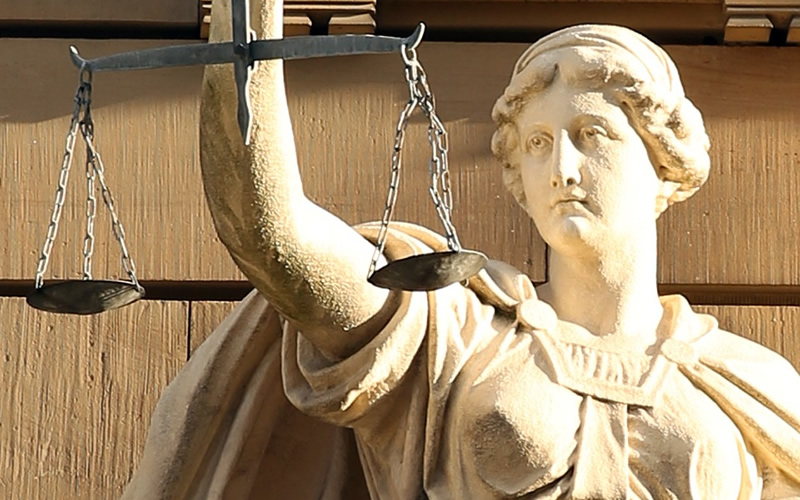
By Lindsay Street, Statehouse correspondent | No one opposing the Pay Equity Act really wants to talk about it. After all, who wants to be on the record for opposing a bill that would require employers to pay the same wage to all employees who work the same job and hours — regardless of their gender or race?
![]() “You’re instantly going to be labeled a sexist jerk,” said D.C.-based Independent Women’s Forum President Carrie Lukas. The conservative think tank focused on women’s policy issues opposes state pay equity laws. “It’s tremendously dangerous (to oppose equity laws), and you get a lot of very vicious criticism when you question anything with women in the workplace.”
“You’re instantly going to be labeled a sexist jerk,” said D.C.-based Independent Women’s Forum President Carrie Lukas. The conservative think tank focused on women’s policy issues opposes state pay equity laws. “It’s tremendously dangerous (to oppose equity laws), and you get a lot of very vicious criticism when you question anything with women in the workplace.”
State and national studies have reported wide wage gaps for women, minorities, those with disabilities and the LGBTQ community when compared with white, straight men.
Advocates for the recently-introduced S.C. pay equity legislation found in H. 3615 and S. 372 appear to agree with Lukas on the political implications of opposing the bills.
“That’s a really unwise position to take, given that women are an economic force in our state as employees and consumers and most people are overwhelmingly in favor of equity and opportunity and realize this is an important strategy,” said Ann Warner, CEO of South Carolina-based and progressive Women’s Rights and Empowerment Network.
The House and Senate versions of the Pay Equity Act seek to mandate that all full-time employees, regardless of gender, sexual orientation, national origin, disability, race or religion, must be paid the same for the same work. Failure to do so could result in employee litigation against the employer.
“It’s an incredibly strong and robust piece of legislation that would both help to correct for some of the current disparities and prevent future wage discrimination,” Warner said.
The bills were introduced two weeks ago, and have been assigned to the Senate Labor, Commerce and Industry Committee and the House Judiciary Committee. Neither bill has been assigned a subcommittee yet.
Bipartisan support growing

Advocates for pay equity say the biggest threat to the bills in the House and Senate are a quiet death with the proposals being snuffed out in a subcommittee before ever having a chance to make it back to the floor. A version of the proposal has been floating in the House for several years, according to lead sponsor Rep. Wendy Brawley, D-Richland.
Lexington Republican Sen. Katrina Shealy introduced the Senate’s version of the bill. She is supporting it because the proposal includes other protected classes such as national origin, religion, ethnicity, sexual orientation, gender identity and more.

Shealy said pay equity is a policy few are talking about this session, despite the fact that the proposal could have a big impact on the state — if only it gets through committee and back to the floor. She said the House’s version has the best chance, where that body has 23 women lawmakers — one fifth of the chamber — to help push the bill to a vote.
Statehouse Report reached out to 10 male lawmakers for this story — eight Republicans and two Democrats. Few had anything to say. Most said they had not read the bill yet. Both versions have bipartisan support, and the House version has at least two Republican men co-sponsors: Reps. Gary Clary of Pickens and William Cogswell of Charleston. Neither responded to requests for comment.
Senate LCI Chairman Thomas Alexander, R-Oconee, said he has been focused on workforce development and has not looked at the legislation in detail. He said he will read the bill once a subcommittee sends it to full committee. House Judiciary Chairman Peter McCoy, R-Charleston, did not respond to requests for comment.
‘Irrational disparities’
When advocates talk about pay equity, they cite the existing wage gap experienced by women, minorities and people with disabilities. These are the pennies-on-the-dollar statistics that are compared with white males.
The Darla Moore School of Business released a report in 2017 that said women in South Carolina earn 73 cents for every dollar that men earn, and that black women earn 53 cents for every dollar that white men earn. WREN did not have statistics for the LGBTQ community or for those with disabilities. Some national statistics peg the gap at about 14 percent for those with disabilities. A Prudential survey showed that while homosexual men earned somewhat more than heterosexual women, most in the LGBTQ community received far less in salary when compared with heterosexual men.
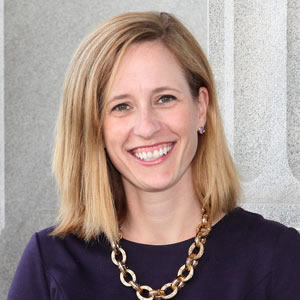
“The wage gap has been wide for decades,” Warner said. “It started to close when the federal Equal Pay Act was introduced in the 1960s but that has really stagnated in the last couple of decades … There is a need for more intervention at the public policy level to help correct these irrational disparities that come up.”
Warner said that most employers are not seeking to actively discriminate against employees and that many times, they are basing salary off of an applicant’s previous salary history — which can count against women and minorities as the cycle of being paid less is perpetuated. The Pay Equity Act would remove that question from applications.
Opponents say the statistics are misleading.
Lukas said if pay studies control for the number of hours worked, about one-third of the women’s wage gap goes away. But she agreed a gap exists, just not that it’s the government’s role to fix it.
“There are instances of abuse but I think some of the desires to try to control or make sure there is a fair process can end up inadvertently hurting those that are trying to help.”
She said a woman with less experience may not be hired due to an employer deciding to hire a man with more experience since they would receive the same compensation. She also said a “heightened sense” of litigation in the state could scare off economic development.
Warner disagreed, saying the Pay Equity Act could actually spur economic development in the state due to sending a strong signal of valuing work from all people, and helping with some labor shortages in the state by inspiring loyalty.
- In 2018, Massachusetts enacted a pay equity law. Read more about it here.
Work ahead
Republican Sen. Sandy Senn of Charleston is the only female lawmaker on the Senate LCI Committee. She said she hasn’t dived into the legislation but she felt it had “a whole heck of a lot of merit.”
“It will be hard pressed for our male colleagues to say ‘no’ to that but I’ve seen stranger things,” Senn said. “It could not come out of the desk drawer.”
In the House, Brawley is working to gain more support.
“We will do everything we can,” Brawley said. “It’s hard for me to understand how anyone can be opposed to paying people fairly for the work they’re doing.”
Warner said a vocal constituency will be needed for this bill.
“We have to keep the pressure up with our legislators and our business community to say this is good business … This is going to help our economy grow,” she said.
- Have a comment? Send to: feedback@statehousereport.com
NEWS BRIEFS
Prosperity eludes S.C., radio outlet abruptly shutters, more
By Lindsay Street, Statehouse correspondent | Prosperity is out of reach for most South Carolina residents, according to a new scorecard that ranks the state 50th out of 51 states and the District of Columbia.
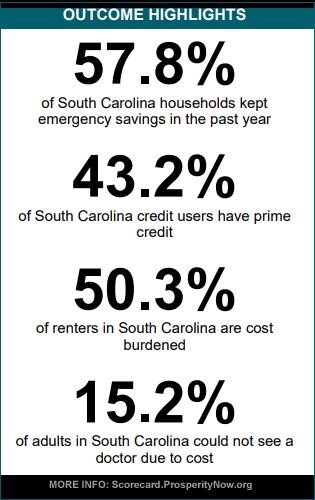 The low prosperity rank from Prosperity Now, is mostly tied to the extreme gaps in affluence indexes between white residents and residents of color.
The low prosperity rank from Prosperity Now, is mostly tied to the extreme gaps in affluence indexes between white residents and residents of color.
The rank is based on states’ performance on economic measures for all residents but also accounts for racial disparities in outcomes. Relative to other states, South Carolina’s performance ranks in the bottom 10 for residents overall
Other takeaways from the scorecard:
- The state has not enacted these policy measures that Prosperity Now says are key for helping prosperity: elimination of TANF asset test, implementation of an earned income tax credit that is refundable and at least 15 percent of the federal credit, indexing or raising the state’s minimum wage to $15 per hour, and discrimination protections for Section 8 voucher holders.
- 2 percent of S.C. households have prime credit.
- 8 percent of South Carolina households set aside emergency savings in the past year.
- 3 percent of renters in South Carolina are cost burdened.
- 2 percent of adults in the state could not see a doctor in the last year due to the cost.
- Read the scorecard here.
In other news:
![]() News coverage shrinks. South Carolina’s Statehouse news coverage has diminished with the unexpected closing of South Carolina Radio Network. The radio news outlet provided online and airwave news coverage for the Statehouse, and also provided general news for the state. A spokesman for Learfield/IMG told The Post and Courier that the outlet had been “underperforming” and that the cancellation is part of a “larger strategy.” Full disclosure: the writer of this brief worked for SCRN in 2013 and 2014.
News coverage shrinks. South Carolina’s Statehouse news coverage has diminished with the unexpected closing of South Carolina Radio Network. The radio news outlet provided online and airwave news coverage for the Statehouse, and also provided general news for the state. A spokesman for Learfield/IMG told The Post and Courier that the outlet had been “underperforming” and that the cancellation is part of a “larger strategy.” Full disclosure: the writer of this brief worked for SCRN in 2013 and 2014.
Child marriage. The House and the Senate have passed bills that will repeal a decades-old law that allows a pregnant child to be wed to an older man. Now the two bodies must reconcile the bills before sending to Gov. Henry McMaster’s desk. Read more.
House poised to make local government funding changes. The House has approved second reading of a bill that will reformulate how the state funds local governments and tie that funding to a percentage of state revenues. H. 3137 is slated for third reading on Tuesday.
Voucher law set to expand. Another bill slated for third reading next week is H. 3136, which will increase scholarship amounts for special needs children of a member of the Armed Forces who is either active duty or was killed in the line of duty. The Revenue and Fiscal Affairs Office estimated this would apply to about 20 students statewide and cost an additional $220,000 annually if they were each to receive the maximum scholarship amount.
Hot toddies/topic. House members could soon see legislation on the floor that would let some local municipalities decide if they want alcohol sales on Sundays. H. 3082 advanced to full House Judiciary Committee this week.
Driving under the influence of electronics. On Tuesday, a House subcommittee approved a bill that will fine drivers $200 for using a cellphone or other electronic device in their hands. South Carolina banned texting while driving in 2014, but some say the law is weak. The bill will be heard by the full House Education and Public Works Committee.
Hatchery deal paves way for sale. State-owned utility Santee Cooper has given its fish hatchery to S.C. Department of Natural Resources in a move that could help with the sprawling utility’s sale. Read more.
Weekly update on Palmetto Priorities
 Throughout the legislative session, we’ll provide you relevant updates related to our list of Palmetto Priorities, 10 big policy areas where major progress is needed for South Carolina to escape the bottom of lots of lists. Over the last week:
Throughout the legislative session, we’ll provide you relevant updates related to our list of Palmetto Priorities, 10 big policy areas where major progress is needed for South Carolina to escape the bottom of lots of lists. Over the last week:
Gun reform: Regulating purchases. Democratic lawmakers are again championing bills to restrict or regulate gun purchases in gun-friendly South Carolina. S.C. Rep. Wendy Brawley, D-Richland, told Statehouse Report this week that she will reintroduce an assault weapons ban and hold a press conference with the Coalition Against Gun Violence on the anniversary of the 2018 deadly Parkland high school shooting. The press conference is 10 a.m. Feb. 14. Charleston Democratic Sen. Marlon Kimpson also reintroduced a bill to close the “Charleston Loophole” this week, allowing for two additional days on background checks for some gun buyers. Read more.
- Previous column: Lawmakers need to add sensible gun reform to 2019 agenda (December 2018).
- Previous coverage: Kimpson’s bill advances in committee (March 2018).
Poverty: Rural revitalization. Two House bills seeking to help rural residents of the state were introduced this week. H. 3780 (White) seeks to facilitate more broadband internet service in rural areas, with several provisions, and H. 3782 (Bamberg) seeks to enact the Rural Revitalization Act with certain individual income tax deductions in rural counties.
Corrections: Bringing back “Old Sparky.” The Senate has passed final reading of a bill that would make the electric chair the de facto method of execution in the state. The state has been unable to execute those on death row since 2011 due to being unable to obtain lethal injection drugs. Orangeburg Democratic Sen. Brad Hutto added a provision to allow inmates to choose a firing squad instead. There is a similar measure in the House.
Looking ahead
Click below for other items coming up in the Statehouse:
- House calendar
- Senate calendar
- Have a comment? Send to: feedback@statehousereport.com
TALLY SHEET: Lawmakers file bills from transparency to criminal sex conduct
Members of the General Assembly filed about 200 new bills and resolutions over the last week. Among the highlights:
 IN THE HOUSE (see all House bills)
IN THE HOUSE (see all House bills)
Golf carts. H. 3776 (Clemmons) seeks to change state law so local governments could regulate mopeds or golf carts for lease in their jurisdictions. (Editor’s Note: Golf carts on city streets are the scourge of neighborhoods. Allowing them to be rented would make streets less safe.)
Registration by party. H. 3777 (Clemmons) seeks to make voter registration to become a partisan registration process, with several provisions.
Abortion. H. 3779 (Bennett) seeks to prohibit “dismemberment abortions” with exceptions.
Rural broadband. H. 3780 (White) seeks to facilitate more broadband internet service in rural areas, with several provisions.
Rural revitalization. H. 3782 (Bamberg) seeks to enact the Rural Revitalization Act with certain individual income tax deductions in rural counties.
Workplace freedom. H. 3786 (Norrell) seeks to promote workplace freedom and prohibit several forms of discrimination, including that based on sexual orientation or gender identity.
Alimony reform. H. 3787 (Govan) seeks to offer certain spousal benefit payments to offset alimony, with several provisions.
Pay increase. H. 3809 (Cobb-Hunter) seeks a 5 percent pay increase for state employees.
Certificates of need. H. 3823 (Mace) seeks to repeal health care corticates of needs, with several provisions, including naming part of the licensure program the “State Healthy Facility Licensure Act.”
Criminal sexual conduct. H. 3829 (Norrell) seeks a definition of “consent” in relation to criminal sexual conduct and add “fraud by the actor” as part of the definition. H. 3830 (Norrell) would enact the “Sexual Assault Survivors’ bill of Rights Act,” with several provisions.
IN THE SENATE (see all Senate bills)
More sunshine. S. 453 (Harpootlian) seeks to repeal multiple matters currently exempt from public disclosure through state FOIA law and to remove exemptions for the General Assembly to close meetings.
Veterans’ Affairs. S. 454 (Shealy) seeks to restructure the state Division of Veterans’ Affairs to having a director appointed by the governor, enumerate duties and make other changes.
Nursing S. 464 (Davis) seeks to enact the Advanced Practice Registered Nurse Act, which includes many provisions related to cremation authorization, prescription privileges and other health care matters. H. 3821 (Clary) is similar.
BRACK: A community’s soul depends on a robust editorial page

By Andy Brack, editor and publisher | Pick up a newspaper in many towns in South Carolina and you’re likely to find something missing: a robust editorial page.
 Over the last few years, editorial pages have been dying as big media organizations with an eye to profit made cut after cut, relegating many pages of opinion to shadows of their former selves. Blame it on greed. Blame it on the rise of social media or Internet competition. But one thing is clear – a reduction in opinion is not a good thing for communities that want to remain vibrant.
Over the last few years, editorial pages have been dying as big media organizations with an eye to profit made cut after cut, relegating many pages of opinion to shadows of their former selves. Blame it on greed. Blame it on the rise of social media or Internet competition. But one thing is clear – a reduction in opinion is not a good thing for communities that want to remain vibrant.
“A newspaper without a good editorial voice is a newspaper with a fairly weak soul,” said Ferrel Guillory, a University of North Carolina at Chapel Hill media professor and former Raleigh editorial writer.
“Newspapers don’t demand that people agree with them, but are a principal instrument in setting a community’s agenda,” he said. “And so when you lose that voice, you lose part of its identity, part of the soul of a community.”
You don’t have to agree with what’s said on an editorial page. What some writer professes might make you spit up your morning coffee. But that’s what a good community newspaper is supposed to do – to challenge readers to think and give them information that they can use to make informed decisions about their town, county, state and nation.
Newspaper editorial pages are just as important to democracy as bills, votes and public meetings. A good local newspaper with a thoughtful, sometimes cantankerous, editorial binds a community. Without a good editorial and watchdog voice, communities drift, relying too often on big personalities, chambers of commerce or something else for leadership. Throw a newspaper into the mix and you have a calming and vigorous voice that can spearhead change for the good.
“The community and newspaper depend on each other,” Guillory said. “The community has important decisions to make. An editorial page helps the community come to grips with the big issues facing them. And part of the way we do that in a democracy is debate.”
Unfortunately across America, local newspapers are dying. A new study by UNC-CH shows more than one in five newspapers have closed in the last 15 years. In South Carolina, Allendale County has no newspaper. In neighboring Georgia, 28 of 159 counties have no newspaper. Across the country, nearly half of 3,143 counties have just one newspaper, usually a small weekly.
But just as alarming are “ghost” newspapers that are shells of what they were. Compare The State in Columbia or the Greenville News in Greenville, both vibrant and thick newspapers 20 years ago, to today’s product, now owned by big corporations. Despite good journalism still coming from local reporters at those papers, the daily newspaper feels flimsy. Their editorial voices have dimmed.
“The newspaper industry has, largely, put a gun to its own head with many decisions it has made,” notes editorial writer Richard Whiting of the Greenwood Index-Journal. “Corporate ownership launched the big decline.”
He said he understands how many newspapers cut editorial staff to save money and tried to fill the void with national syndicated columnists and more attention to letters from readers. But ultimately, that is an abdication of responsibility by organizations that are supposed to “be a beacon of knowledge and to attempt to steer where the community is going.”
Sam Spence, editor of the alternative Charleston City Paper, observed that social media seems to chill some traditional media outlets. “Afraid to be lumped in with the red-hot, quick-fire reactions on social media, you rarely see much insightful opinion from [establishment] media anymore. Sure, some papers may use the institutional weight of their masthead to urge action on an issue, but rarely on anything novel that you haven’t seen consensus crystalize in the few days prior.”
Our country, still mired in division most recently evidenced in the longest-ever shutdown of the federal government, is desperately seeking unity. Editorial voices from newspapers are a vital component to help people vent, share ideas and find common ground. But for editorial voices to do their jobs to be a glue for communities, media owners have to stop killing them off.
Disclosure: Brack’s weekly column is carried by several newspapers, including the Index-Journal and City Paper. Have a comment? Send to: feedback@statehousereport.com
SPOTLIGHT: Conservation Voters of South Carolina
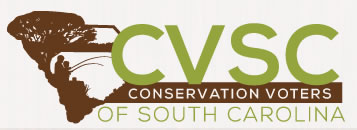 The public spiritedness of our underwriters allows us to bring Statehouse Report to you for free. This week, we shine our spotlight on the Conservation Voters of South Carolina, a statewide nonprofit organization that fights for the Palmetto State’s air, water, land and energy through political action. The organization is bipartisan, pragmatic and effective.
The public spiritedness of our underwriters allows us to bring Statehouse Report to you for free. This week, we shine our spotlight on the Conservation Voters of South Carolina, a statewide nonprofit organization that fights for the Palmetto State’s air, water, land and energy through political action. The organization is bipartisan, pragmatic and effective.
Through scorecards and advocacy at the Statehouse, CVSC holds South Carolina legislators accountable for their votes and actions. As a small organization that operates as a nonprofit and has a political action committee, we have a big impact. Learn more today by clicking any of the links below:
MY TURN, Saul: Trump is tearing apart the heart of our society

By Dr. Robert A. Saul, special to Statehouse Report | Indecent is defined as “offending against generally accepted standards of propriety and good taste.” I cannot think of a person more suited to that description than our current president.
 Before I make enemies of all of my friends who are supporters of our current president, let me make one thing clear. You might like his policies and results and support him for that reason. But I see no way that his words and actions can be endorsed. Plus I won’t accept the arguments that other people do similar things. Leaders are supposed to lead, not demean. Leaders are supposed to set a high standard, not drag us through the mud with their crude behavior. Citing the misbehavior of past presidents is not a relevant response to my argument here.
Before I make enemies of all of my friends who are supporters of our current president, let me make one thing clear. You might like his policies and results and support him for that reason. But I see no way that his words and actions can be endorsed. Plus I won’t accept the arguments that other people do similar things. Leaders are supposed to lead, not demean. Leaders are supposed to set a high standard, not drag us through the mud with their crude behavior. Citing the misbehavior of past presidents is not a relevant response to my argument here.
His lying, insulting, belittling and defaming are just starters. He has endorsed violent actions. He has attacked American heroes and the families of American heroes. He shows no regard for those in need. His life in the lap of luxury has shielded him from the real issues that our citizens are facing. People need health insurance and many folks cannot afford private insurance. And they need accessible jobs and affordable, safe housing.
Separating families in a power play to push an agenda is reprehensible and immoral. Setting policies that have led to children being effectively incarcerated, being tear-gassed or, even more tragically, dying in the custody of the United States is a sad state of affairs. No outrage has been expressed about these tragedies, only mild indifference and actually blaming others.
He uses ugly language unbefitting the presidency. He continually threatens our democracy with his attacks on the press and the judiciary. He refuses to use science in this administration. He uses medicine (derived by science) for his hair growth and his elevated cholesterol but paradoxically science has no place in his administration as our environment is corrupted to the detriment of our children now and in future generations.
His faith is fickle and manipulative. He sees diversity as a dirty word, instead of recognizing it as one of our strengths. Civility is neither in his vocabulary nor in his actions. I am astonished that so many legislators enable his perpetual lying and feed his narcissism as he considers himself the best president in the modern era. He is not. In 700 days as of Dec.20, 2018, our president has made 7,546 false or misleading claims. That renders him completely untrustworthy.
I could go on and on but I must admit that my blood pressure gets out of control. Suffice it to say, I am not a fan and hope that the GOP will come to its senses and put up another candidate in the 2020 election.
The pillars of a civil society are based on truth telling, being trustworthy, using science in a responsible manner, maintaining civility, embracing diversity as a strength and practicing faith with integrity. Those are tough pillars to attain but our current president doesn’t even come close or aspire to do so.
His manner is indecent and tearing at the fabric of our country.
Dr. Robert A. Saul is a Greenville pediatrician and the author of “My Children’s Children: Raising Young Citizens in the Age of Columbine” and “All About Children.” In 2015, he offered this commentary on the toxic effect of poverty.
- Have a comment? Send to: feedback@statehousereport.com..
FEEDBACK
FEEDBACK: Books open doors to learning
![]() To the editor:
To the editor:
Thanks for your commentary on funding the Imagination Library. Surrounding children with books is also a truly delightful way to open doors to learning. Here is my four-month-old granddaughter, Annemarie, about to devour a good book.
— Agnes Pomata, Wadmalaw Island, S.C.
Send us your thoughts … or rants
We love hearing from our readers and encourage you to share your opinions. But you’ve got to provide us with contact information so we can verify your letters. Letters to the editor are published weekly. We reserve the right to edit for length and clarity. Comments are limited to 250 words or less. Please include your name and contact information.
- Send your letters or comments to: feedback@statehousereport.com
MYSTERY PHOTO: Lowcountry building might be tough to identify
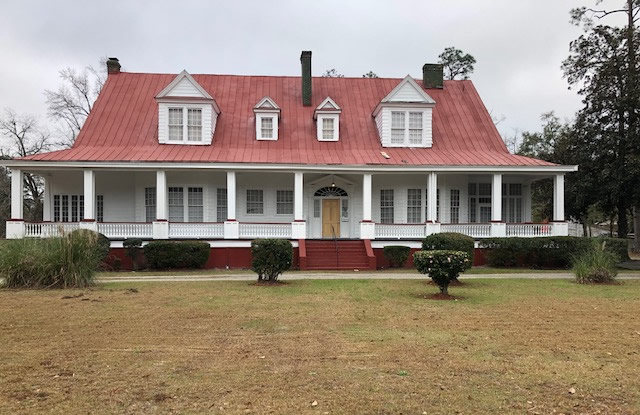
This week’s Mystery Photo, sent in by a reader, might pose a pretty good challenge to any photo sleuth. Hint: It’s in the Lowcountry. Send your guess to feedback@statehousereport.com. And don’t forget to include your name and the town in which you live.
Our previous Mystery Photo
Our Jan. 25 mystery, “Imposing structure,” lives up to its name. The Sumter County Judicial Complex may not be somewhere you want to go willingly! (Somebody told us that the only government facilities that people want to go to are libraries, to which we would add museum and parks.)
Congratulations to those who correctly identified the courthouse: Dale Rhodes of Richmond, Va.; Jay Altman of Columbia; Steve Willis of Lancaster; and George Graf of Palmyra, Va.
Graf shared that he had a harder time than usual identifying the “big structure” in Sumter County. Some interesting info:
“According to architects stevens-wilkinson.com, a linear park was created, which spans the setback area from East Calhoun Street southward toward East Hampton Street. Required site circulation concerns were placed well away from the public side of the courthouse. All service vehicles and courthouse traffic now share a driveway toward the northeast corner of the facility, while a small restricted parking lot was created for the judges. Based on traditional architectural elements, the new courthouse features four courtrooms, Clerk of Court, Sheriff’s holding area, judges’ chambers, jury deliberation rooms, public areas, and security core.”
Sumter County is named after Gen. Thomas Sumter (1734-1832), the “Carolina Gamecock” who served in the U.S. House and U.S. Senate after the Revolutionary War.
- Send us a mystery: If you have a photo that you believe will stump readers, send it along (but make sure to tell us what it is because it may stump us too!) Send to: feedback@statehousereport.com and mark it as a photo submission. Thanks.
S.C. ENCYCLOPEDIA
HISTORY: Summerville, S.C.
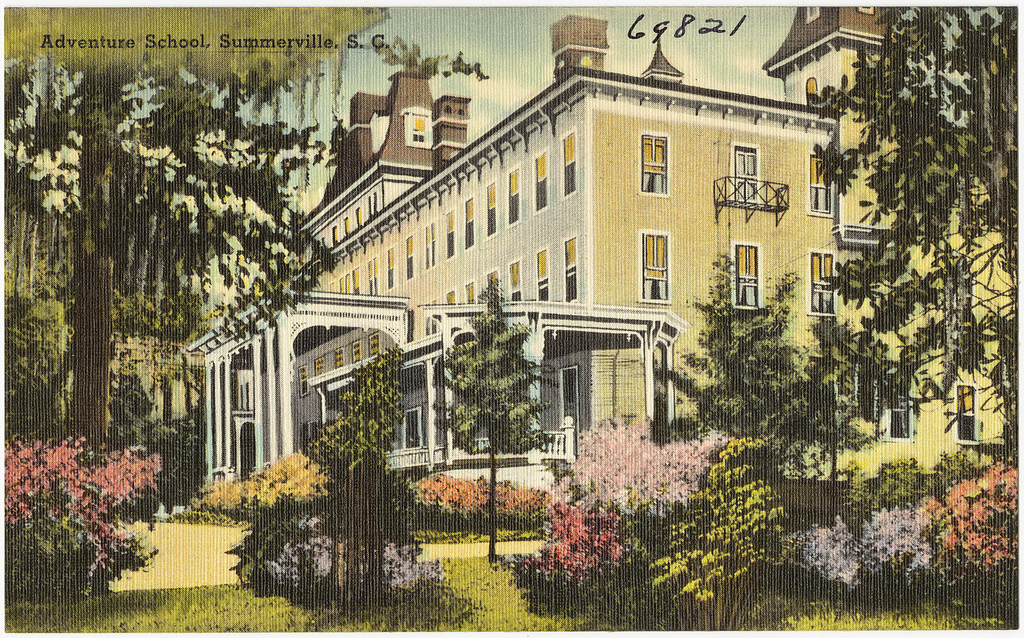
S.C. Encyclopedia | Summerville, the “Flower Town in the Pines,” was established as a summer refuge for plantation owners of St. George’s Dorchester and St. Paul’s Parishes. The decline of the colonial town of Dorchester on the Ashley River was another source of population for the village. As Dorchester lost population, St. George’s Dorchester Episcopal Church and the Presbyterian White Meeting House congregation relocated to Summerville. Prior to 1831 Summerville had few year-round residents, but the population swelled in the summers as lowcountry planters sought the breezes and pine forests that were deemed healthier than their swampland rice plantations.
In 1831 the South Carolina Canal and Rail Road Company constructed a railway from Charleston to Hamburg. Summerville was one of the first stops along the route. The company laid out town lots in a grid pattern near the tracks, which it called New Summerville to distinguish it from the rambling arrangement of the old village.
Summerville was incorporated in 1847, and one of its first ordinances restricted the cutting of trees in the town limits. From its beginnings it was a resort, and much of its history has been tied to tourism and temporary residence. After the railroad was built, some antebellum residents of Summerville commuted to work in Charleston.
The South Carolina writer William Gilmore Simms lived for a few years in Summerville and traveled on the train to his editor’s job in Charleston. This early commuter traffic was a precursor to the bedroom-community character of Summerville in the twentieth century. During the Civil War the town was a refuge for lowcountry planter families, who moved away from the coast to escape Union attacks. The epicenter of the 1886 Charleston earthquake was near Summerville.
Toward the beginning of the twentieth century, Summerville was promoted as a health resort and vacation destination. Large inns, the most notable being the Pine Forest Inn, provided accommodations for summer visitors. Sanatoriums were built for persons recuperating from tuberculosis and other pulmonary illnesses.
As Charleston became home to an increasing number of United States military bases in the twentieth century, Summerville grew. For the first half of the twentieth century the town’s population was stable. In 1910 the population was 2,355, and it had grown to only 3,028 in 1940. In 1960, just before the Sun Belt population explosion, the population was 3,633, but by 1990 the residents numbered 22,519. Five years later the population within the town limits was about 25,000, with an additional 50,000 residents in nearby areas. Summerville is a key element in the Charleston–North Charleston Metropolitan Statistical Area. Seven buildings and historic sites in and around Summerville are on the National Register of Historic Places.
Summerville is governed by a mayor and an elected city council. The Timrod Library Society, a private subscription library, was founded in 1897 and continues to be active. The Summerville-Dorchester Museum opened its doors in 1992 and exhibits photographs, artifacts, and other historical materials relating to the town and Dorchester County.
— Excerpted from an entry by Alexander Moore. This entry may not have been updated since 2006. To read more about this or 2,000 other entries about South Carolina, check out The South Carolina Encyclopedia, published in 2006 by USC Press. (Information used by permission.)
ABOUT STATEHOUSE REPORT
Statehouse Report, founded in 2001 as a weekly legislative forecast that informs readers about what is going to happen in South Carolina politics and policy, is provided to you at no charge every Friday.
- Editor and publisher: Andy Brack, 843.670.3996
- Statehouse correspondent: Lindsay Street
More
- Mailing address: Send inquiries by mail to: P.O. Box 22261, Charleston, SC 29407
- Subscriptions are free: Click to subscribe.
- We hope you’ll keep receiving the great news and information from Statehouse Report, but if you need to unsubscribe, go to the bottom of the weekly email issue and follow the instructions.
- © 2019, Statehouse Report. All rights reserved.
















 We Can Do Better, South Carolina!
We Can Do Better, South Carolina!